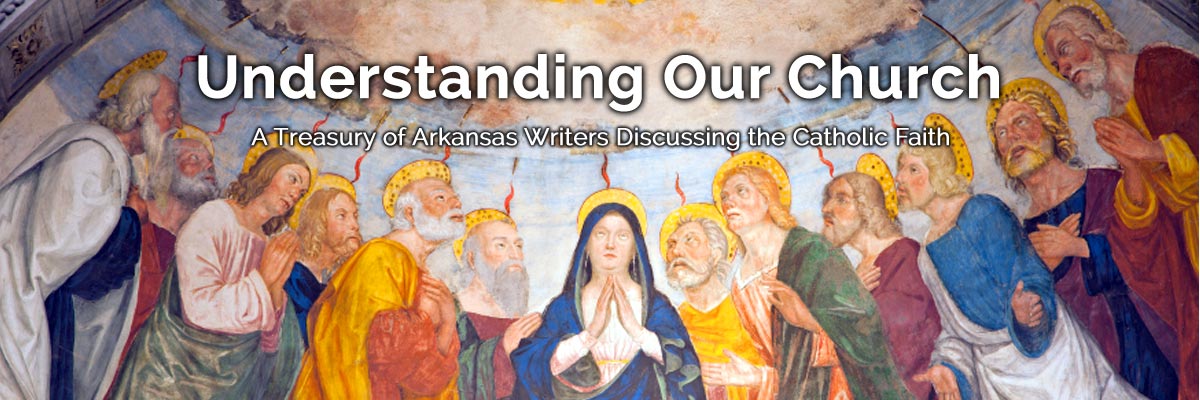Official Website of the
Catholic Diocese of Little Rock
Titles for Mary encapsulate her virtues, roles in our lives
Published: September 29, 2016
By Kelli Nugent
St. Edward Church, Texarkana
Growing up, I always looked forward to the annual parish picnic, held in the spring on the grounds of our diocesan retreat center. As a child the most exciting thing about the picnic wasn’t the food or the outdoor Mass, but the huge boat named the "Star of the Sea."
It was an enormous boat moored at the edge of a tiny lake that the kids would climb on, run around on and explore. In reality it wasn’t a boat at all but simply a structure built to look like one.
It wasn’t until many years later that I came to realize that Star of the Sea was a title for our Blessed Mother, but not one that I understood. Many of the titles of Mary are clearly connected to her attributes, virtues or role in God’s plan of salvation: Mother of God; Refuge of Sinners; Mother Most Pure; Mother of Good Counsel; Virgin Most Powerful; and Virgin Most Prudent are just a few of many.
Each title encapsulates a different quality, virtue or role of the Blessed Mother. Mary, in her customary, quiet humility brings us to Jesus, reminding us, “Do whatever he tells you.” (John 2: 5)
Eventually, I encountered other titles for Mary that didn’t make sense to me, Tower of Ivory, Mystical Rose, Gate of Heaven, Mirror of Justice, Seat of Wisdom, etc. Let us look more closely at some of these titles:
Seat of Wisdom — Jesus is called in Scripture both the Word of God and the Wisdom of God. He, who was formed in the womb of his mother, Mary, was after his birth, carried by her arms and seated upon her lap as every mother does to their own child. Her own lap can be thought of as a type of human throne for the one who is the eternal God in the flesh. This is one of the ways in which she is called the Seat of Wisdom.
Gate of Heaven — St. Peter Damian, a doctor of the Church, was the first to record the expression, Gate of Heaven. Mary is the chosen gate through which our Lord opened heaven to man and in which he passed to begin his incarnate existence on earth. Mary’s intercession on behalf of the souls in purgatory opens the gates of heaven to them.
Mirror of Justice — When one looks at themselves in the surface of still water or a looking glass, they see a reflection. Mary is the chosen creature who most perfectly reflects her Son’s divine holiness and goodness, another meaning for the word, justice. Living with the one she loved and, as a daughter of Israel, longed for, Mary becomes a living image of her son and savior, truly a mirror of justice.
Tower of Ivory — The Song of Songs is the basis for the title, Tower of Ivory. “Thy neck rising proudly like a tower, but all of ivory ...” (Song of Songs 7:4). A tower rises above other structures in a place. At the crucifixion of Jesus, Mary stood upright at the foot of the cross, accepting of her own passion watching her divine Son’s torture and death, while Peter and all the other apostles, except John, scattered. Mary is fittingly compared to ivory in both brightness, purity and exquisiteness.
Mystical Rose — Just as the rose is esteemed as the queen of the flowers, so Mary is the queen of spiritual flowers. The invocation, mystical rose, can refer to several aspects of the life of the Blessed Mother. She can be thought of as the greatest contemplative or mystic. When mystical can be understood as meaning, “hidden,” the epithet may allude to Mary’s body being “hidden” in heaven.
Star of the Sea — The given name of Our Lady in the original Hebrew is translated "Miryam." The most popular interpretation of this name is "Star of the Sea." St. Bernard expounded upon this title, saying that, “(It) so well and aptly applied to the Virgin Mother … Whoever you are, if you find yourself being tossed about in the gales and storms of this world’s waters … fix your eyes on the brightness of this star … If the winds of temptation rise, if you are running on the rocks of tribulation, look to the star, call to Mary.”
Each title encapsulates a different quality, virtue or role of the Blessed Mother. Mary, in her customary, quiet humility brings us to Jesus, reminding us, “Do whatever he tells you.” (John 2: 5)




